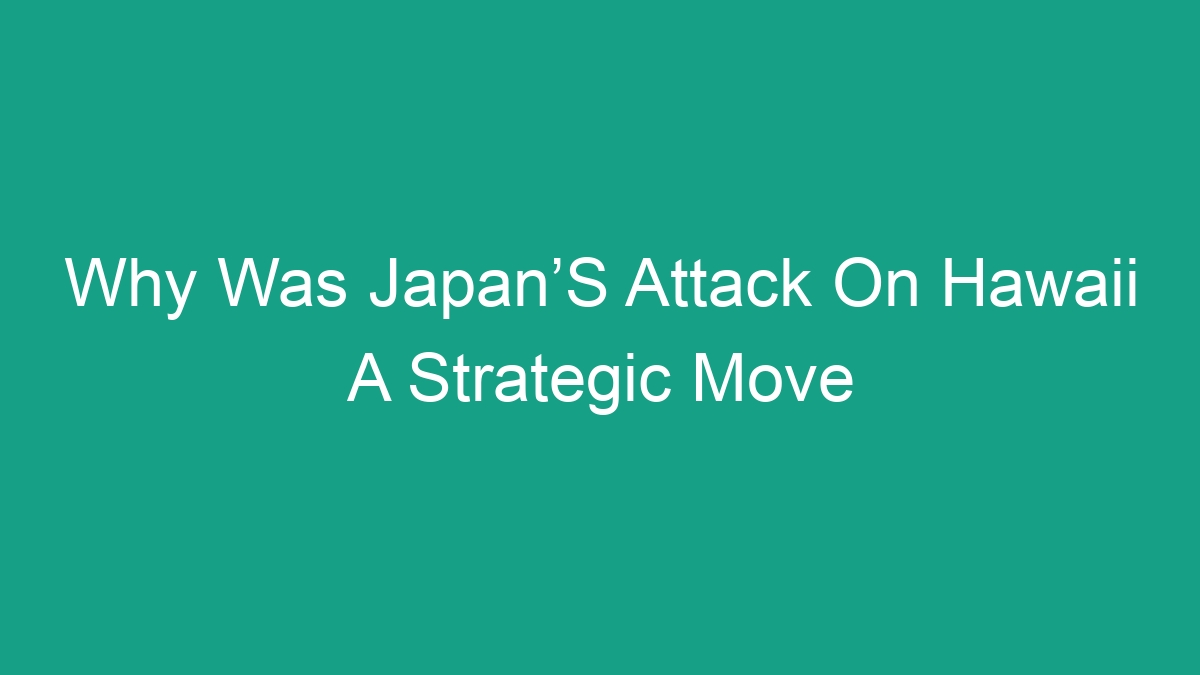
Japan’s attack on Hawaii, specifically the surprise attack on Pearl Harbor on December 7, 1941, was a strategically calculated move with significant implications. This article will delve into the various reasons and factors behind this pivotal event in history.
1. Context of Japan’s military expansion
Japan’s military expansion in the early 20th century was driven by its desire to secure access to resources such as oil, rubber, and metals. The country faced severe resource constraints due to its limited land and lack of natural reserves.
2. The US as a potential threat
The United States, with its strong naval presence in the Pacific, posed a potential threat to Japan’s expansionist ambitions. Fears of US intervention in Japan’s conquest of Southeast Asia and the Pacific became a driving force behind the decision to launch a preemptive strike against the US Navy.
3. Weakening the US Pacific Fleet
The primary objective of the attack on Pearl Harbor was to cripple the US Pacific Fleet and prevent immediate US intervention in Japan’s military operations in the region. The attack aimed to destroy as many battleships, aircraft carriers, and other critical naval assets as possible.
4. Seizing strategic initiative
By launching a surprise attack on Hawaii, Japan aimed to seize the strategic initiative and establish dominance in the Pacific theater. The element of surprise was crucial in achieving this goal and catching the US off guard.
5. Psychological impact
The attack on Pearl Harbor was intended to demoralize the American public and weaken their resolve to engage in a prolonged conflict. The shock and outrage caused by the attack were expected to tilt public opinion in favor of a negotiated settlement with Japan.
6. Provoking a quick end to the war
Japan believed that a successful attack on Hawaii could provoke a quick end to the war by forcing the US to accept Japanese territorial gains in Asia and the Pacific. By dealing a devastating blow to the US military, Japan hoped to expedite a favorable resolution to the conflict.
7. Impact on global geopolitics
The attack on Pearl Harbor had far-reaching implications for global geopolitics. It drew the United States directly into World War II and catalyzed its role as a major player in the Pacific theater. This event marked a turning point in the trajectory of the war and its eventual outcome.
Conclusion
In conclusion, Japan’s attack on Hawaii was a highly strategic move with multifaceted objectives. The attack aimed to weaken the US military, assert Japanese dominance in the Pacific, and alter the course of the war in Japan’s favor. The repercussions of this event reverberated globally and shaped the geopolitical landscape of the 20th century.
FAQs
Q: What were the immediate consequences of the attack on Pearl Harbor?
A: The attack led to the United States’ entry into World War II, galvanizing its military and industrial capabilities to confront the Axis powers. It also resulted in a declaration of war against Japan by the United States.
Q: How did the attack on Pearl Harbor impact Japan’s standing in the war?
A: While the attack initially dealt a severe blow to the US Pacific Fleet, it ultimately galvanized American resolve and unity. Japan’s subsequent defeats in battles such as Midway and Guadalcanal weakened its position in the war.
Q: What lessons were learned from the attack on Pearl Harbor?
A: The attack on Pearl Harbor underscored the importance of vigilance and readiness in military defense. It also highlighted the dangers of underestimating potential adversaries and the perils of complacency in national security.


